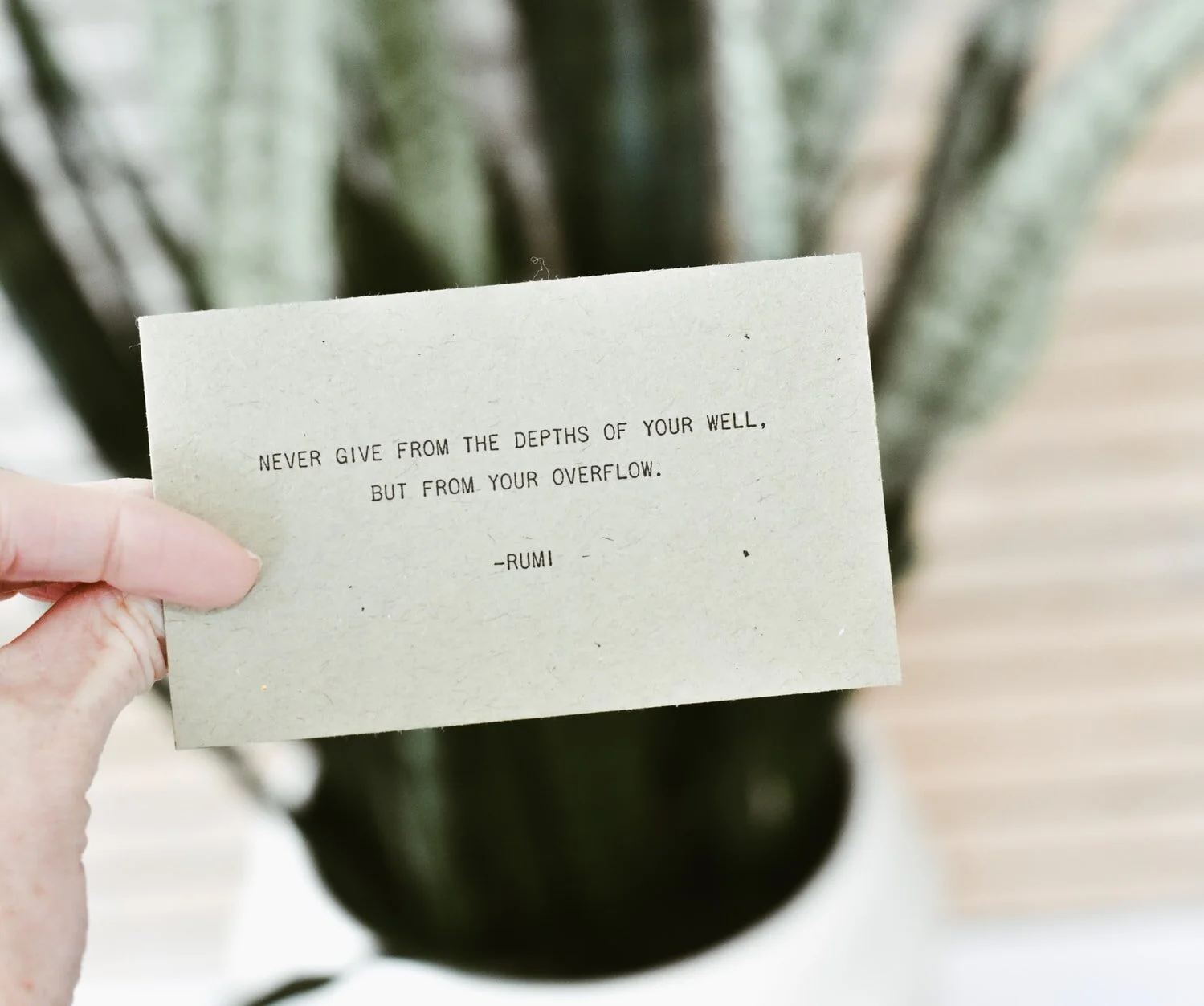So Your Loved One is a Therapist or Counselor in Private Practice...
/As a therapist in private practice for many years, and a business coach and supervisor to clinicians in the U.S. and around the world, I regularly hear about, and intimately understand the challenges we therapists face in this unique, exciting, complex, and at times, draining field of mental health.
The general public has little to no understanding about the stressors that therapists deal with daily. Partly because we do our best to shield current and potential clients who are in need of our help; partly because it is important to honor our professional boundaries with respect to personal disclosures that would not benefit the client; partly because therapists are thought of as super humans who have unlimited empathy, resiliency, and patience on tap; partly due to the false idea that we therapists have somehow mastered the ability to magically rise above conflict, stress, hurt, emotional pain, addiction, grief, or mental illness; partly because people want to believe that therapists are impervious to human struggles; and partly because therapists are not accurately portrayed in TV shows and movies.
While the public perception of the counseling profession may be skewed, those nearest and dearest to us certainly see the toll this demanding work takes at times. Without support from our loved ones, without patience, understanding, and compassion, and without a good tribe of supportive colleagues, it is hard to imagine how any therapist could possibly maintain a clinical career for the long haul. This is why we have such a high rate of burn out, disillusionment, and yes, even incidents of premature death in our industry. This profession can be rewarding, but it is not without risk.
Though our loved ones may try to empathize, it can be difficult for our significant others, family members and friends to truly understand what a therapist deals with. And, because we are bound by confidentiality, we cannot share details of our client related work stress over the dinner table. Every profession has its own stressors, yet the clinical profession has unique features that are not often known to those outside of the mental health field.
Day in and day out, hour after clinical hour, busy week after busy week, month after demanding month, year after year we are exposed to trauma, addiction, mental illness, eating disorders, child abuse, death, suffering, rage, depression, anxiety, suicide, divorce, infidelity, grief, personality disorders, shame, hopelessness, OCD, domestic violence, and other tragedies. Making room for all of this human pain and trauma is part of the clinical work. And we also celebrate the healing achievements in our clients lives as well! This is why we do the work we feel called to do - because we care and we want our fellow human beings to live their best and healthiest lives.
Pause break…
If you are a therapist who is reading this and thinking, “Geez, why all the negativity, I’ve never experienced exhaustion, compassion fatigue, vicarious trauma, scarcity thinking, depression, anxiety or burn out!” then I celebrate this with you as you are truly a unique unicorn in this challenging field. This blog is about education, validation and self care suggestions for therapists from a diverse group of contributing therapists (see below) who do struggle from time-to-time, myself included. This is collectively written as a support. The intention of our combined voices is not to add negativity to a community that many of us love, hold as sacred, and hope to be a part of for a long time.
However, denying there are very real challenges that many of us face in this work is not helpful. Putting on a mask of toxic positivity is not helpful either. Not acknowledging that many therapists cannot sustain a 1:1 practice filled with hurting clients for years on end without physical or emotional repercussions is not helpful. This is why conversations with our colleagues so often focus on making room for intentional self care in this field, without it the healer will perish.
Harkening Back…
I recall a time when I was in graduate school, just starting my clinical internship, and I was invited to a holiday party for therapists. As a newbie I was so excited and honored to be included! Each of us wrote our names, how long we had been practicing, and our biggest wish for the new year on a large sticky label that we fastened to our chests. It was an ice breaker of sorts.
What I did not expect as I mingled around the room, was to see the following wishes on six of the therapists who had been in practice for over 10 years:
I wish I could leave my practice
I wish I did not have to see so many clients
I wish I wasn’t a therapist anymore
I wish I could do anything but therapy
I wish I could find my humor and joy again
I wish my family and friends supported me more often
I remember feeling confused and startled by their wishes. I remember thinking, “Well…that is a joy kill!”
As I watched one of the therapists (“I wish I wasn’t a therapist anymore”) sit by herself in a darkened room off of the main party area, quietly eating a piece of pie and sipping on coffee in isolation, I felt a tug of compassion for her as she clearly wanted to be left alone. She looked…well…grey. Literally, her skin looked grey, and she seemed worn out, joyless and completely burned out.
We happened to leave together, and as she got in to her car she looked at me with a tired smile and said, “Good to meet you Mari. You’ll make a great therapist. But, please remember to take care of yourself. I wish I would have, it’s a really tough profession.”
Good advise. And if I knew where to find her, I’d thank her for her honesty.
Fast forward a few years…
There I was living my dream, juggling a full private pay practice, seeing 7-8 clients a day, 5 days a week, plus group work, plus managing a myriad of responsibilities that go with business ownership, 12 hour days, certification workshops, supervising, speaking, teaching, attending CEU trainings, writing books, balancing a personal life and self care as best I could (or not at all), and like most full time private practice therapists, the list goes on and on and on.
As the years continued to progress, I found that my excitement for clinical work was waning. I started empathizing with that tired, grey faced therapist at the holiday party. I began to finally understand what my grad school professors were warning us about with respect to clinical burn out and compassion fatigue.
Don’t get me wrong, I loved my work (and still do), I adored supporting my therapy clients (and still do), but I simply could not keep going at that pace. I had to makes shifts, develop other income streams, and practice a variety of modalities with my clients. Weaving in mindfulness, guided imagery, walk talk therapy, and telehealth sessions were of great benefit to my clients and added freshness for me as well. I also began to weave in regular time off vs. giving lip service to self care.
Writing books and exercises and materials is something I deeply enjoy. I developed a niche in creating clinical forms packets, group forms packets and other books and materials to support my fellow clinicians. This has been a fun and rewarding “side gig.” Additionally, one of my most enjoyable professional roles is providing business coaching and support for my clinical colleagues. I love connecting with clinicians, rolling up our sleeves together, creating focused goals and tasks that help that wonderful therapist client move closer to their own professional dreams.
Personal Energy Boundaries
I also began to set boundaries with my loved ones. I had allowed a few friends and family members to lean too heavily on me for emotional support; I wasn’t always good about managing their expectations. There were far too many lunches or dinners after a long clinical week where I found myself sitting and listening to a list of woes. That was the very last thing I had energy for. Like many therapists, I found myself isolating. Where I was once a social butterfly, I began declining invitations.
Here is a truth bomb: There seems to be a strange idea that because we are therapists, we absolutely love listening to problems 24/7. If there is a non-therapist reading this right now, let me assure you that this assumption is not true. In fact, this is a number one pet peeve for the majority of therapists I coach, supervise, and have friendships with. As I shared with a coaching client colleague recently, “I don’t expect that my hairstylist friend style my hair each time we get together, or my attorney friend give me legal advise over lunch, or my tech friend fix my computer when we meet up for dinner, so it is up to me to have boundaries with my friends “picking my brain” for advise and support. I am happy to listen for a few minutes, and extend compassion, but just like everyone, I need to be able to step out of my professional role and just...be.”
Learning to find my voice, protect my energy, and let my friends and family know that while I loved them, I no longer had the internal emotional resources available to give to the level that I once had.
Managing expectations that I was willing to listen intently to their problems each time we got together, or play therapist during a vacation, or offer solutions, or be their only go to for advise and deep emotional support, no matter how much I loved each of them, was no longer an option given the profession I was in.
I could still give, and I still wanted to listen now and then, and on occasion I was happy to be of support, but not to the extent that they had become accustomed to. Not their fault, not my fault. Things had changed and I needed to communicate that clearly, firmly, and kindly without feeling shame or guilt.
Additionally, as the person that many of my loved ones counted on to make the plans, host the parties, pick up the pieces, make the appointments, plan the vacations, do the driving, do the listening, be the caregiver, schedule the reservations, help out, organize, and so on and so forth, I finally admitted that I needed others to pick up the baton and start doing some of the heavy lifting and planning. I simply did not have the energy to be the planner, the organizer, and the reliable one everyone else could lean on and count on for those things. I just could not do it all. And I no longer wanted to.
A final straw/wake up call for me was at the end of an extremely busy weekend workshop where I had been juggling a ton of prep tasks for weeks, a friend stopped by my office to unload about her latest heart break. As I distractedly listened while cleaning up the workshop room, stacking up forms, throwing out trash, and so forth, she said, “Mari, what time is it?” I stared at the iPhone in her hand, and then glanced at the clock on the wall, AND the clock on the table, and replied, “Um, I’m going to need you to figure that out for yourself”, and…we both burst in to laughter. She got it.
Eventually as I continued to know, name, and maintain my boundaries, using humor when needed to drive the message home, the dynamic gradually shifted, a new normal was established, and my loved ones understood and respected (for the most part) these boundaries. They know that I am there for them and love them with all of my heart, but I cannot pour from an empty cup, and I will not jeopardize my emotional and mental well being to please others. That’s a big nope!
I also had to manage my expectations about who I could count on to be there for me when I was going through personal challenges. For example, last year just before the holidays I suffered a fractured ankle, soft tissue and major tendon and muscle damage in my ankle and foot. As such I was on my back, leg and foot elevated at my doctor’s insistence, and in 3 various casts for nearly 12 weeks. I could not drive, I could not wash my hair or shower without assistance, I could not run errands, and I was in physical therapy for months, on a walker, then a cane, then a pronounced limp, and eventually I made a full recovery.
As the holidays came and went, and weeks turned in to months I was isolated, lonely, depressed, and dependent on others to help me - which was very difficult for an independent person like myself.
Yet the most painful part of the process was not missing the holidays, or the months of physical therapy, rather it was discovering that a handful people in my life that I considered close friends, people that I had been there for during their own challenging seasons of stress, grief, family issues, marriage issues, or physical infirmaries were no where to be found. Crickets.
It was a painful but important lesson for me. As the saying goes, “I had to stop being the “go-to” person for people I could not go to.” During this chapter of my life, I dealt with feelings of sadness, rejection, confusion, resentment, hurt, and anger. We therapists are fallible human beings with real human emotions and vulnerabilities just like any other person. We yearn to be nurtured, poured in to, cared for, supported, listened to, and yes...even pampered a bit from time-to-time.
As you can see, the life of a therapist is both rewarding and extremely challenging. It is far more than sitting in a chair in a comfy office nodding one’s head while making sympathetic clucking noises. We are not superhuman, not even close. We are regular humans who deal with the ups and downs of life, who happen to have specialized skills and tools, along with years of education, clinical experience, on going training, a high level of emotional intelligence, and a deep desire to be of service and support to others.
As I began to wrap up this article, I realized that opening this blog up to other therapist colleagues and inviting them to share their challenges as mental health care providers, along with tips for self care was important.
Thus, I have included wise words from a diverse group of over two dozen well respected therapists who are at the top of their field below - men, women, non binary, straight, gay, various ethnicities, and different specializations and challenges. My hope is that by sharing our experiences we can validate and support other therapists, help educate the public, and offer illumination to our nearest and dearest who may not always understand the challenges we face in our therapeutic roles.
I deeply appreciate the following clinicians who took time out of their busy practices, work schedules, and personal lives to thoughtfully share their wisdom, insights, experiences, and self care tips below.
Together we go far - please read on…
Kindly and in support,
Mari A. Lee, LMFT, CSAT-S, CPTT-S, MBAT-S
mari@thecounselorscoach.com
29 Therapists Share Their Private Practice Challenges & Tips
Practicing a Mindfulness Routine…
One of my greatest struggles as a therapist is when I come home after work after a long clinical day and my partner wants to talk about our day and connect, which is a good thing. However, I am very often drained and do not want to hear another human voice for awhile. Instead of isolating or disconnecting from my partner who I love, I worked to develop a mindfulness-based ritual that allows me to transition from my home life to work and from work to home.
Upon waking each morning as I am taking a shower, I practice mindfulness of the feeling the water, of the sounds of my breath and awareness of my thoughts. This allows me to begin to transition from my home mind set to my work mind set. After work, I do the same thing. I will hop into the shower and wash my day away practicing mindful rituals. During this time, I do not review my thoughts. I just acknowledge them when I notice them then come back to my breath. This is not a long shower, but it is an important part of my self care. Honoring this ritual allows me the time I need to be able to step out of my clinical role, transition into my home life, and engage with my partner Chris in a meaningful and connected manner. I have found over the years working with other therapists who struggle with these issues that when they develop a mindful practice the stressors of the day have less impact on their life at home. I know for me it has been life changing.
Additionally, helping clinical clients learn how to incorporate mindfulness in to their long term healing and recovery has been a game changer! And as the co-founder of The Mindfulness Academy for Addiction & Trauma Training, it is an honor to provide support and training for my fellow therapist colleagues as they grow in their mindfulness skills, both personally and professionally.
Darrin Ford, M.A., LMFT, CSAT, MBAT-S, Newport Beach, CA., www.TMAATT.com
Managing a Busy Practice in the Midst of Chronic Pain & Illness…
The complexities of dealing with both chronic pain and chronic illness (and all of the accompanying doctor's appointments, physical therapy exercises and equipment, medications, side effects, post-surgical issues, etc.) have given me great life experience and "street cred" as a health psychologist. Pain in particular is a great equalizer. But chronic illness and chronic pain are especially difficult for clinicians who have others relying on them for help, which requires both clinician and client to show up consistently, sometimes without regard to how they're feeling.
There's pressure to be a role model, the "perfect patient," (which doesn't exist, by the way), and sometimes I end up pushing myself too hard so that I can say that I too have done it all, and still am not healed or entirely relieved of pain. I manage by being real with my clients and sharing just enough - telling them I have to sit in a different chair so my post-surgical ankle gets some relief, or that I'm having a medication reaction and please don't mind my scratching. Sometimes we just laugh, because it gets pretty absurd - and that's part of healing too.
Gretchen Kubacky, Psy.D., Los Angeles, CA, www.DrGretchenKubacky.com, Author, The PCOS Mood Cure: Your Guide to Ending the Emotional Roller Coaster
Balancing the Personal & Professional with Compassion…
In my relationship, my partner would sometimes have anxiety about the goals that I had in my business. I knew I needed to establish multiple streams of income, which would interfere at times with my relationship because in trying to establish these streams, there was concern about the time and commitment that they would take.
I had to offer reassurance to my partner, but also be real that it would equal some diminished time and energy for my relationship. To counter this, I set specific time aside where I wouldn't allow myself to work, and where I could focus on my relationship.
Dr. Michael J. Salas, PsyD, LPC-S, LCDC, CST, CSAT, Dallas, TX https://vantagepointdallascounseling.com
Ending the Stigma…
I personally struggle with both anxiety and ADD. It’s not uncommon for me to forget deadlines, obligations, commitments, and even appointments due to distraction and disorganization, and then anxiety threatens to prevent me from addressing those mistakes. Burying my head in the sand is very seductive. This affects my business, my family life, and my friendships. Sometimes, rather than seeing me as a person who is struggling, others believe that I simply don’t value them and can’t imagine that I, as a therapist, am vulnerable to same pitfalls as they are. But I am. And I don’t always handle it as gracefully as I would like.
Regardless of how others may judge me, and some do, I know that by facing my mental health issues with courage and conviction I walk a path that helps me understand my clients’ struggles with deeper nuance and appreciation than if I “had it all together”. It’s taken me awhile to get to that place of courage. Initially, when anxiety began taking a foothold after my divorce, I felt a pronounced jab of shame each time I admitted what I was going through to anyone, so I avoided doing so as much as I could. The energy and effort it took to maintain my composed façade exhausted me, exacerbating the anxiety in fact. I was hesitant to let my own therapist know the full extent of how it had been impacting me because I had a fantasy that he might see me as unfit to practice and would discourage other therapists from referring to me, or might try to talk me out of my profession. So, it took me much longer than it should have to reach out to those who could help. It wasn’t until a dear friend and respected therapist suggested that I be more aggressive in finding treatment that I gave myself permission to risk looking “less than” in the eyes of my colleagues, family, and friends. In fact, as you may have guessed, sharing myself more authentically with those I care about simply brought us closer.
I got the help I needed, and now, over a year or so later, I have a much better handle on my anxiety and it no longer limits me in the ways it had before. Plus, I can speak with my clients about their struggles from a place of felt experience and better reach them when they fall into that painful, isolated place. I know that place, can join them there, and be their compassionate companion as we, together, navigate out. Being human is a gift. And, since 1 in 5 Americans (according to the National Institute for Mental Health) have some sort of mental health disorder, I think its our responsibility to be more open with our challenges and connect to others from that level.
The next time I sense judgement from another for receiving treatment for my struggles, I can confidently respond with grounded ease and acceptance of my humanity and hopefully offer an example of being with mental illness without shame, without submitting to the attack of judgement, without questioning my worth. And how healing is that!
Chelsea DeKruyff, LPC, Austin, TX, www.chelsealpc.com
The Importance of Authentic & Reciprocal Relationships..
As a clinician, wife, mother, and entrepreneur, I wear many hats and it can be difficult trying to juggle family and all types of relationships. I have found that these roles, especially when paired with having a private practice, can create a sense of isolation and can contribute to having one-sided, inauthentic relationships. The sense of loneliness can be sometimes self-inflicted and overwhelming. It is a welcomed privilege to be a helper, however, being everything to everyone can be a great burden especially when isolation is combined with inauthentic relationships.
I have experienced these kinds of relationships because friends see me as their “go-to therapist friend.” Someone said that to me once and I was triggered because I didn’t feel the relationship was reciprocal. There was no give and take-only take. The shallow relationships, lack of perspective, and isolation gives way to extreme loneliness because our profession has a code of ethics that we must adhere to in order to protect our clients and their innermost thoughts, feelings, and desires.
I have learned that I have to protect myself through powerful boundary-setting, caring for my mental and physical self, and establishing meaningful, fruitful relationships. These elements are everything I work through with clients and is something that each therapist holds as sacred.
Latisha Taylor Ellis, LPC, Cumming, GA, Empowered Transitions Counseling & Consulting, www.empowertransitions.com
Healing Negative Comparison & Finding Peace in Saying No…
I quickly learned that one of the best ways to build my practice was to put myself out there as a writer, speaker, and contributor. At first, I didn't turn down any requests for my time. I didn't care if I was speaking to five people at a church or five hundred people at a conference. I wanted to contribute and build a solid practice. Even though it started out slowly, this well-intentioned locomotive eventually gained dangerous momentum as speaking and writing commitments piled up. "I'm living the dream," I told myself over and over. But, I noticed I started feeling resentful that everyone wanted my time for free (even though I told myself this would eventually pay off). I also noticed other colleagues who were producing new programs, materials, books, and other offerings that left me feeling like I was constantly falling behind. Pressure from peers and potential clients made it hard to turn town opportunities to put myself out there. I eventually burned out and went quiet for a couple of years.
I realized that I was in fear the entire time. I was operating from a deficit mindset, convinced that if I wasn't constantly producing, I wasn't going to make it. Well, I don't believe that anymore. I've had enough experiences since then to see that when I offer myself in a spirit of service, I don't feel the paralyzing fear that keeps me from protecting my precious energy. I'm more productive, I'm more clear-minded, I'm more joyful, and I'm more confident. And, all of that makes me a better therapist.
Now, when I am presented with an opportunity to contribute, I take my time to respond so I can check in with my schedule, energy, relationships, and other important indicators on my personal dashboard. I check to make sure I'm not operating out of fear. I trust that I can say "no" and still be okay. I quiet down the comparisons and trust that my unique contributions matter now or later.
Geoff Steurer, MS, LMFT, St. George, Utah, www.trustbuildingacademy.com
Moving Through Grief...
Grief comes in all shapes and sizes. In fact, anything that’s lost or changed can be considered grief worthy. As a therapist, I have grieved the loss of two marriages while working, the loss of my mother to cancer after a grueling year of sickness, and just recently, the loss of my beloved sister. The latter has been profoundly different.
When a relationship is ending, you usually know things aren’t working. You try all kinds of ways to make it work, but eventually there is that moment of knowing it is time to call it quits. When a loved one is terminally ill, you know what is on the horizon. You watch your loved one suffer, so when the fated day comes, there may be a sense of relief that your loved one is no longer suffering. At least that is how I felt with my mom.
My sister’s death came as a complete shock. I woke up that day like any other and sent her a funny text as I’d do…and I was informed an hour later she had been found dead. There was no knowing. No warning. No preparation. This happened three and a half weeks ago. I have worked some, and have found it helpful. My clinical work is a time for me to focus on others and get a break from my new reality.
For my own self care, I have beefed up my therapy. I have done what I am told by experts and even accepted a prescription to help me sleep. But mostly I am listening to myself and what I need, which is literally different from moment to moment. Understanding grief and it’s stages is helpful. It aligns. But again, a no preparation loss is a whole thing of its own.
Jennifer Acker, LCSW CSAT, New York, NY, www.JenniferAckerlcsw.com
Spoon Theory & Self Care…
For me, navigating health challenges has led me in being more intentional in how my private practice is set up. I apply the concept of “Spoon Theory” which is an idea often embraced by those with chronic pain, illness and disabilities, called Spoonies. Spoonies only have so much mental, emotional and physical energy to expend in a day and each spoon represents a unit of energy.
So as a Spoonie therapist I think to myself, “how can I set up my practice so that I am not overexerting myself and have enough spoons to get me to the end of the day?” One thing I do when I see clients in the office is I give myself a 20-30 minute cushion between sessions to rest and practice self care. Self care between sessions may mean going for a quick walk, practicing some deep breathing, listening to music, stretching and drinking water. It also means only working half days in the office.
In my practice, there are certain days during the week set aside for video therapy sessions and this is another way I incorporate self care. I am able to work out of my home office while supporting clients with their therapy goals. The added bonus is that online therapy is often a really a good fit for many of my clients because it matches their self care needs too. I do a lot of therapy work with caregivers, and those with chronic pain, illness and disabilities. Being able to work with them online, allows them to get therapy services in a way that is more accessible for them, while also allowing me to support my own self care needs.
Daniela Paolone, LMFT, Westlake Village, CA , www.westlakevillage-counseling.com
The Power of “No”…
The power of “No” was an alien concept to me prior to my shift into this career; I was brought up in polite southern culture where you were taught be evasive about committing to events, people and conditions. Saying “no” meant you were a bad / selfish / self-centered individual. What made it hard for me, was that most of the time, I really did not want to say “no”, because I actually wanted to help if I could, and of course I wanted to avoid letting anyone down.
After literal decades of work on this (late bloomer in this aspect, I guess), it is still a struggle... but my education, training and experience as a clinician have taught me how necessary it is, as well as how nuanced and balanced the decision has to be. I’ve managed to channel that drive into more healthy ways of addressing the issue, and in that channeling, opened up a wider perspective on this phenomenon.
As beginner clinicians, the majority of us have great challenges in saying “no”, which often delays the earning of a living wage in private practice. “No” is sometimes “No, I cannot slide my fee for you”, or “No, I can’t advise you on that” (to friends / family / acquaintances that want our clinical perspective), and sometimes “no” to our colleagues when we recognize unethical behavior. Most important to me is the internal acknowledgment of “No”, I must meet my needs and boundaries in a healthy way in order to be present for my loved ones, my colleagues, and my clients.”
Scott C. Musgrove, PsyD, LMFT, Los Angeles, CA , www.scottmusgrove.net
Less Emotional Availability…
I spend my working day listening to individuals, couples and families who are feeling sad, hopeless or not enjoying things they used to enjoy. Many days I have multiple clients crying, worrying or feeling anxious, nervous, jittery or stressed out; generally feeling overwhelmed with life. Other days I may spend with individuals who are struggling with significant traumatic experiences such as, but not limited to, sexual assault, physical violence, emotional abuse, survivors’ guilt etc. Like most people in any given job, some days are harder than others.
A therapeutic relationship is not a natural one. It depends greatly on the client being willing to open up with many of their dark secrets and thoughts. It requires honesty, transparency and emotional intimacy. Some relate the feeling to a close friendship, but it isn’t, nor can it be because of professional ethics. Additionally, therapy isn’t “just sitting and listening to people’s problems” all day. Rather it is an intricate web of communication, interpretation, empathy, compassion and realism – sometimes all at the same time.
So by the end of the day many therapists, including me, have no more “spoons” left and must rest in silence away from further challenges of those they love to replenish for the next day of healing (see https://en.wikipedia.org/wiki/Spoon_theory). Often times therapist’s loved ones may be left feeling unheard or pushed away. We do not intend to do this. We simply have no more “spoons” and often need our loved ones to hold the space of silence with us / for us to recharge.
I recharge with meditation, riding my cycle, playing / walking my pups, reading or simply napping. I am also in therapy and will continue to be as long as I continue to heal others because therapy does work and asking for help is okay.
Rebecca Stiemens, LCSW-S, Certified EMDR Therapist, Kingwood, TX, www.abundancecounselingservices.com
Therapists are human beings…
When we enter the therapy room, we are (per many traditional modes of training) called to be the “tabula rasa” - the blank slate upon which our clients will drop all of their thoughts and feelings to be absorbed into us, sponge-like, sorted out and reprocessed, and formed into something useful, or important, or life-changing. We enter thoughtfully, composed, and intent on performing a service, to the very best of our abilities, that has everything to do with our clients and (presumably) little to do with us.
Of course, we also enter as human beings (emphasis on the HUMAN), with all of our juicy bits of lived experience and formed ideas and needs and wants and priorities. This begs the question - if we bring all of our parts into that room with us, where do they go when the therapy begins? It’s my assertion that all those juicy bits - the marks and splats and drawings all over our “slates” - are the elements that make for truly great therapy work, and essential to our role as therapists.
Dana Belletiere, LICSW, MSED, Keene, NH., www.danaLICSW.com
Vicarious Trauma and Support for the Healer…
A while back, within a span of three days of appointments, I heard stories that dealt with graphic child sexual abuse, exploitation of the poor, human trafficking, incest, and child neglect. I don't know how people can do therapy with certain populations without experiencing therapy themselves. I primarily work with couples suffering from the consequences of addiction and trauma, and the stories I hear on a day to day basis are enough to turn my stomach.
For me to effectively walk with my clients through their own stories of trauma, I must be awake to the reality of how their stories intersect with my own, rub up against my wounds and stir up my fears. I have to be committed to my own self–care, honest about the weight of the stories I carry, in order to preserve my ability to be a healing witness to my client's traumas. The alternative is absorb my clients' traumas and then crash and burn.
Jake Porter, LPC, NCC, CSAT, Houston, TX, www.DaringVentures.com
Referring Out to Honor My Energy & Boundaries…
As a Registered Play Therapist, I love working with children and families. Unfortunately, I learned a hard lesson through a very stressful experience working with a high conflict couple. These parents had a verbal and written understanding that I do not voluntarily participate in litigation complete with court fees if I am subpoenaed. I ended up getting pulled into a custody court battle where I was not reimbursed for my time according to the signed therapy agreement. This cost me time, money, and an incredible amount of frustration and stress. I learned that I can refer out any cases where a custody battle is happening.
One of the many benefits of being in private practice is that I can set my professional boundaries and policies. I can say “no” and refer out to other therapists that enjoy going to court and participating in custody evaluations. The way that I do this is by asking careful questions over the phone before I schedule new clients. I always request to meet with both parents for the initial assessment. I review all my legal paperwork and ask detailed family history. If the parents are unable to sit together to complete the initial assessment due to conflict and ongoing issues with court, I refer the family to a different therapist. It is always helpful to have an updated referral list on hand with a description of what the different therapists in your area specialize in.
My family and friends struggled to understand the stress of what I was dealing with during that time due to confidentiality. The stress of this situation caused me to become sick. What helped me was talking with my husband about balancing household chores and asking him to take our son to preschool so I could have time to hit the gym before my day started. Asking for what I needed helped me get through this time.
Lori Crosby, MFT, RPT, Rancho Cucamonga, CA, www.LoriCrosbyMFT.com
The Wounded Healer…
After 20+ years in the Railroad industry, my therapist encouraged me to return to grad school and pursue a degree in Clinical Psychology. I opted to take him up on that challenge, and at the age of 40 I enrolled into a Marriage and Family therapy program with classmates half my age. The upside to transitioning careers midway through life are the opportunities that come one’s way based on “life experience”. As a Hispanic male with said ‘experience’, in a field predominately comprised of women, doors have certainly opened (for which I am incredibly grateful)!
However, this transition has certainly been met head-on with its own form of ‘life experience’. As a recovering addict, I recognize the path (and the second chance) that my Higher Power has provided as being one for the “good” of others, sometimes at the toll of my own physical and emotional health, including that of my spouse’s physical and emotional well-being. Cancer, chronic illness, infertility, loss of our home (due to fire), vehicle loss (automobile accident), severe anxiety (i.e., panic attacks), debilitating bouts of depression, and of course, financial concerns that come with the territory of “starting over”.
I call myself a Wounded Healer. When clients hear bits and pieces of my story (Dr Rob Weiss interview with Joe Saavedra), especially the part about my Higher Power providing my wife and I the opportunity to reconcile our marriage (after being divorced for 10 years), this ‘life experience’ spoken of earlier, provides hope to clients. Support by way of friends, family members, colleagues, and my faith community have been vital for keeping this Wounded Healer moving forward with a purpose of making an impact for the “good” of others, One day at a time.
Joe Saavedra, LMFT, SATP, Boulder, CO., Emmaus Road Counseling Colorado
Recovering Workaholic…
Being addicted to work is a unique phenomenon. All of the behaviours that are the outworking of the addiction are reinforced as being positive. For me, it was having a large case load and being the person that all the complicated cases were given too; billing the most hours in a day ( any boss loves the most productive rain maker). So for me learning how to untangle my need for external validation from the continuous positive reinforcement of my unhealthy behaviours was tough. Actually no, it is confusing. I am a recovering workaholic.
To add this this, work was my safe place. Yes, it was and is. When I am working I feel good, I feel competent, accomplished, satisfied, I like who I am when I am working. Who would not want more of that in their day, week, month year? I am a recovering workaholic.
You cannot address the pain, distress and dis-ease that comes with being addicted to your work on your own. To tell someone who is addicted to work that they are more than what they do simply does not compute. It is like asking a Windows based PC to read a MAC file. Does not compute. We need a team of compassionate yet firm loving people, to help us untangle the doing from the being. I am a recovering workaholic.
Jo Muirhead, BHlthSc (Rehabilitation Counselling), MASRC, MCDAA, Sydney, Australia, www.purpleco.com.au
Managing Counter Transference…
Something that I have struggled with as a therapist is referred to as “countertransference” in the therapy world. Essentially, this is when a therapist “transfers” their feelings onto their client. A fairly typical example of this - a client reminds the therapist of someone in the therapist’s life (e.g., the therapist themselves, a friend, etc), which then may impact how the therapist works with the client.
I share this example because I have experienced it myself on several occasions, more than I’d like to admit and possibly more than I have been fully aware of. I have (had) clients who have sought therapy for very similar struggles that I have experienced myself, sometimes while I was continuing to have the struggle at the same time as the client. I have found this to be a double-edged sword.
While I can wholeheartedly relate from a very deep level with these clients, I have also needed to be particularly mindful of not allowing my own experiences and biases to get in the way of what was in the best interest of my clients.
To help manage my countertransference, I attend to my own personal therapy and also clinical supervision/consultation with colleagues. Both have helped my own healing process, which in turn, helps my clients. Win/win!
Christene Lozano, LMFT CSAT, San Dimas, Pasadena, and Long Beach, CA, www.merakicounselingservices.com
Moving from Burn Out to Balance…
A couple of years ago, I began an extremely busy season of writing, speaking, interviews, professional presentations, and teaching. I published my first book and felt the buzz of being a new author. Though this experience was exciting, it was also draining. I burned myself out saying “yes" to everything. Eventually, I questioned my fit in my field. I found too that my need to be valued by others was insatiable. I needed to value myself.
Through much introspection and personal work, I’ve practiced saying “no” to opportunities that don’t fit my time, interest, and energy. I still feel jealous at times when I see others excelling, but I know my time will come. I won't give up on my dreams. I don’t need to compete or keep up with anyone else.
In the meantime, I continue to practice the self-care and healthy boundaries that help me be the best therapist I can be, serving more fully those whom I support.
Forest Benedict, LMFT, SATP, ForestBenedict.com
Grieving a Loss While Maintaining a Therapy Practice…
I am a grief therapist, and my practice is built around clients who are terminally ill, chronically ill, grief and loss, and dementia. I sound like a lot of fun don’t I? Much of the reason I do what I do is my time as a hospice medical social worker, and my belief that death and grief should be a normal part of life. If we can’t talk about dying and grief and make it normal it just gets bigger and harder to manage. That’s why I also do a lot of education for therapists about death and dying and grief. We have to be able to talk about it. Loss is our one 100% common experience in life for ourselves and our clients.
I’m also a two times widow, and I have worked through the deaths of my wives of necessity. I was with them through their terminal illnesses and their deaths. I worked through both of their deaths and afterward. It sounds so nice to tell other therapists to take all the time they need after a death, but realistically we have clients who need us and a business to keep afloat. How do you manage it? Self-care, scheduling in a way that provides breaks, maintaining a clear focus and staying in the present with your clients and being more than careful about countertransference were key for me. Transparency also plays a role because clients also read obituaries, and staff sometimes talk in the hallways. You will have some clients who realize you have lost a loved one, and may bring it up. Being prepared for those moments while not intruding on the client’s therapeutic process is tremendously important. If the client is a grief client, you will need to evaluate how much disclosure is necessary and how much is too much, while not being untruthful and breaching your client’s sense of trust.
Finally, seeking out consultation or talking with a colleague in your practice if you feel tenuous about your sense of balance, or seeking out your own counseling are options I strongly suggest. It can be very difficult to find a therapist who will see another therapist, and especially one who is an expert in grief, but ask around. We are out there, and getting support is far better than being isolated. “It’s complicated” does not begin got describe all the issues that can come into play.
Jill Johnson-Young, LCSW, , Riverside CA, www.yourpaththroughgrief.com
From Scattered to Focused…
This morning I sit in the middle of my bedroom, making phone calls, texting, grading college student papers, preparing my kid for college, organizing, planning and sorting the last months of this calendar year and early part of next year, and forwarding my new home address to countless contacts, while being surrounded by moving boxes! On the outside it appears that I am juggling it all! On the inside I am executing God’s plan in my life.
As an early career Christian Mental Health professional my journey from scattered to focus did not happen overnight, my focus began when I experienced being okay to disappoint people sometimes. In order to make room for God in my hectic life, I began to change my focus from what I thought others wanted me to be or do and began to be deliberate about the priorities in my life.
Reminding myself to not be preoccupied with the appearances of being able to juggle it all or being afraid that if I say no, that people will stop asking. The untangling of living a “hyped up” life all the time was stealing the joy of processing an abundant life. So now I rest, move, and follow in perseverance, carefully examining my motives of “juggling it all’ because I see Him who is invisible. With every conscience effort I stay off the path of scattered and focus on the One that has already paved the way.
De Angela Jane Smith, M.A. Marriage & Family Therapy, Orange County, CA., www.faithtalktherapy.com
Navigating Vicarious Trauma with Support…
According to the American Counseling Association vicarious trauma is defined as: The emotional residue of exposure that counselors have from working with people as they are hearing their trauma stories and become witnesses to the pain, fear, and terror that trauma survivors have endured. In more practical terms, vicarious trauma is when we feel traumatized by others trauma stories.
Being a trauma therapist I’ve heard about the potential for experiencing vicarious trauma but I never really understood the impact it could have until I began to feel it myself. I felt as if I was holding on to every client’s story and that it was my responsibility to care and tend those stories. I felt as if my body was full and there was no more room left to hold even my own stories. Being a trauma survivor I know the value in gaining a new perspective of the trauma in order to live with it, but I was having a hard time figuring out how to live with and honor all the stories my clients were sharing with me. It was a very difficult time and I was questioning my ability to be a trauma therapist.
Fortunately, the importance of reaching out for support was something I learned early on in my journey as a therapist. I made a commitment to get good support and consultation. I’ve prioritized and I’m happy to pay for a monthly trauma therapist consultation group. The clinical consultation and support has helped me understand that while I can honor and lightly hold my client’s stories I don’t own them.
I’ve also committed to my own weekly therapy. It helps me to maintain my optimal mental health. I’ve learned to use the grounding skills and rituals that I often suggest to my clients — imagine that. The active work of my own has helped me release my client’s trauma to its rightful owner and I’m better able to tune into and manage my own trauma reactions in the moment.
Elizabeth Cush, LCPC, website: https://www.progressioncounseling.com/
Juggling Many “Hats” and Client Challenges…
A few weeks ago I received an email from a client inquiring about a charge to her payment method on file. I knew the charge was correct and kindly referred her to the multiple places she and her husband had signed off on fees and the payment plan. She wrote back that they'd not paid attention to the "small print," which felt to me both accusatory and absurd since the agreement she'd just signed had this information in literally the very second sentence. I had to take a deep breath, tell myself to let it go, and continue to be gentle and kind but firm in my response. I had to act as the accounts receivable department while being mindful of my role as a therapist, as well.
That same day a client curtley observed a candy dish in my office had peppermints instead of the usual fine chocolates. I smiled and told him the candy not part of our agreement but is offered as a gift, and that he was welcome to supply chocolates for the office if that's his preference.
From keeping the Kleenex stocked and ensuring the water is delivered for the waiting area, to monitoring cybersecurity and sending in payroll taxes, most people would be shocked to learn how much goes on outside the therapy room to make a private practice run well. All these tasks must be executed in a way that juggles the business's needs, the therapist's health, and the client's trust in the therapeutic relationship.
Jake Porter, LPC, NCC, CSAT, Houston, TX, www.DaringVentures.com
Controlling my Response while Healing…
For twenty-years I had held a vision of a wellness center that I would open to support survivors of trauma. A few months shy of realizing this dream one of my siblings passed away. A month later I was struck by a medical mystery. The onset of this condition included dizziness that impaired my driving ability and systemic peripheral neuropathy that came on swiftly. The fierceness of the pain was all consuming. Each day it felt like fiery needles driving from the inside out of my body. Juxtaposed to the chronic internal pain was an exterior numbness that set into all parts of my skin. It spread from my face down within weeks. I was diagnosed with a rare autoimmune condition with unknown etiology and no known cure. My death sentence was organ failure. I was terrified.
As if this wasn’t already too much to handle, I already had PTSD, as well as intermittent chronic pain due to multiple disc bulges and herniated discs, as well as slip disc in my back. How did I survive this? I took to Dr. Google and changed to a plant-based diet. Thus, reducing my peripheral neuropathy pain by almost 90%. I also received a second opinion. Last year I was finally told, “Elizabeth the good news is you won’t die”. However, my symptoms are still a mystery.
What kept me going was the day after I was ready to throw in the towel and give up my dreams, I received a call from a woman who experienced betrayal trauma. She was seeking hope, help and healing. I put my feet on the floor and had a purpose to help her heal. At the same time, I took self-care to a whole new level. Some of the emotional medicine that keeps me going begins with a positive attitude. I am deeply spiritual and feel a call to serve others. Most important is the legacy of perseverance and a positive attitude that I model for my family, especially my children. I cannot control the circumstances in my life. What I can control is my response.
Elizabeth A. Poth, LPC, ATR, CSAT, CCPS, BSP-1, Hartland, WI, Odonatawellnesscenter.com
Managing Various roles in a Private Practice…
I have found that being a therapist in private practice is more challenging than when I worked in an agency setting because I've had to learn how to manage and juggle multiple roles or "hats." As a solo-private practice owner, I cover all "front desk" types of tasks from client inquiries to scheduling. I am also the marketer, biller, accountant (and more!) for my practice.
While I felt confident in my clinical skills when I went into private practice, I had to learn a lot of new information and skills in order to adequately do the work that accompanies these other roles. Additionally, there was the added struggle of learning how to best manage my schedule in order to ensure that I was able to attend to and balance the tasks that accompany each of these roles.
Of course, like everyone else, therapists have many roles they fill outside of work. Originally, I struggled to figure out how to manage all of these private practice roles and save energy for my personal interests and relationships, too.
Sarah Leitschuh, MA, LMFT, Eagan, MN, www.sarahleitschuh.com
When Do I Get to Turn Off?…
As a therapist, business owner, wife, and mother, I’m always on the go. If it’s not one thing it’s another. From the time I wake up to the time I go to bed, I am answering questions, putting out fires, turning on fires, or igniting one. Sometimes I just want a break. I want a chance to relax and not have to think about solving a problem, paying a bill, cooking dinner, helping with homework or being a partner. Don’t get me wrong, I love every role that I play, but I also need to refuel.
One thing I wish my family and friends knew about me is that I am not superhuman. While I may put on the brave face, I bleed just like you. When I come home, just once, I would like to rest and tell someone about my day instead of being bombarded with your stuff after I’ve listened to everyone else. I just need 5 minutes to myself, then I’m all yours.
Dr. Tanisha Sapp, LPC, NCC, CST, ACS, www.tanishasapp.com, Facebook & IG: @drtanishasapp
Scarcity Thinking & Self Care…
The world teaches us to be concerned with scarcity from an early age, and a good number of careers thrive on competition and being the best, even among counselors. As children, we're told things like, “don’t waste it, don’t ruin that, don’t use those.” Scarcity literally starts with the word scared, so I'd love it if you remembered that. When we operate out of scarcity rather than abundance we are more critical, less present, and spend a lot of energy worrying about what others have that we may lack. Many counselors are deeply worried about making enough, having enough clients, having the best location, etc. I say we need to stop being focused on what we think we lack and instead focus on potentials, gratitude and collaboration in more areas of life. We humans get really attached to how things are supposed to look, which leaves us often disappointed and stressed. Counselors, too! This field is wide, varied and filled with opportunities for us to grow and learn. If we’re to teach our clients how to be adaptable and flexible we should be living that way, too.
So when your spouse worries about money, your client load, taking time off or seems nervous about the scarcity of clients…breathe, focus on abundance and remember that the universe gives you what you need when you need it. This brings us to taking time off. Why did no one tell me this?? Why did no one grab me by my shoulders and stare deeply into my soul and scream at me, “You must schedule time off!” I get it now. Counseling isn’t like a normal job. Again, counseling isn’t like any other job. It’s a bit like parenting in that there’s a part of me that never feels truly 100% off. Taking time off helps, but it needs to be more frequent and intentional. The last time I went for a massage I spent the first 20 minutes scanning my body for stresses that weren’t mine and pushed them aside so I could fully relax.
Dear spouses, partners and friends who aren’t counselors. Sometimes it takes us longer to sink in to relaxation or time off. For this counselor it’s like physically removing a power pack from your being to put it on a charger until I need it again. Please, give us a minute to transition and step beyond the roles we’ve been in all week. If you find yourself overwhelmed, crabby or unmotivated, please take some you time. You HAVE to do it. Be intentional, and schedule time you’ll value and get recharged from. Your 4th graders art class field trip does not count, nor does going to the grocery store. Make it count, please. Your heart, mind and body will thank you for it.
Sandi Labo, MA, LPC, Littleton, CO
Parenting & Private Practice…
Being a parent and managing a private practice is challenging because I have competing goals, I’m trying to raise kids and grow a business. At the end of the day, I’m an entrepreneur - I do all the scheduling, billing, marketing, vision planning, etc. in addition to seeing clients face-to-face. And, while I do have the flexibility of adjusting my schedule when a kiddo gets sick, I have to reconfigure all the other parts of my business too. With kiddos under 3 years, I can’t really work from home (anyone who’s tried to have a conversation around a toddler can attest to that!).
My ability to be flexible is my greatest asset. My clients know I’m a parent to young kids and my paperwork informs them that I may need to reschedule at the last minute. It’s not ideal, but I’ve found people to be very understanding and flexible in return. Overall, being in private practice allows me to be a more present parent, but it is definitely another hat to juggle.
Heather Seguin, LMFT, CSAT, Practicing in Upland, CA, www.clearchoicecounseling.com
Sometimes my “Reservoir” is Empty…
I love my work. Although my days include listening to people’s life stories, many which are painful, I have been trained to protect myself from secondary trauma. Still, I am human and I feel. I couldn’t do the work if I didn’t feel for others. So after a day of working with clients like Bobbi, Becky, Cindy, Ryan, and Kristen*, I don’t always have that much left of myself to give to my family. I’m not talking about the trauma experienced by people who have been in war, or who have lived through a natural disaster. I’m talking about trauma that one’s nearest and dearest inflict on them.
For example, Bobbi and I have been working together for years. She experienced complex trauma during her childhood. She has come to trust me and knows that it’s safe to let me into her inner world. I accept her without judgement. I believe in her. Becky has had rocky relationships throughout her life. She can’t understand why people won’t accept her on her terms and often displays emotional outbursts. When our session is over, it’s very difficult for her to leave. She attempts to prolong our time together, but that’s just not possible – Cindy will be arriving in ten minutes and I need time to write my notes and use the restroom. Cindy arrives on time. She is a sexual abuse survivor. She has shown so much courage raising her daughter as a single mom; courage she needs to draw upon every single day. When Cindy leaves I prepare for Ryan’s arrival. Ryan is unable to stop obsessive thoughts and compulsions. He suffers from OCD and is in a virtual slave to his rituals. He has had to stop working because of his fears. When Kristen arrives we talk about her feelings. Kristen is a high functioning woman who is a business executive She reveals that she doesn’t have any feelings. She’s puzzled when I ask her about her about that. She describes a pervasive numbness. I dawns on her that she doesn’t like it when her children exhibit their feelings. She knows how to function efficiently but admits that she has never felt love. She hadn’t felt it from her parents, and doesn’t feel it from her spouse. She doesn’t feel it towards her son or daughter either. After Kristen’s session is over, I finish up my paperwork and l lock up the office.
I drive home and am greeted by my husband who is happy to see me and wants to talk about his day and hear about mine - not that I can share anything about the people I worked with due to confidentiality. Later, my adult daughters call to chat and check in. They talk about their kids’ antics or the challenges at work. I’m grateful and blessed that I have a good relationship with my spouse and children, but some days, despite my training and because I'm human, these ears of mine need a rest. Often, after I’ve left the office, I crave solitude. Just one more bid for succor, even from my nearest and dearest, is simply asking too much. On the days when there is still some water left in my reservoir, I serve it with pleasure. But on the days when there’s not a drop left, I let the calls go to voice mail.*all names and identifying features changed to protect client confidentiality.
Michelle Halle, LCSW, Lakewood, New Jersey, www.michellehalle.com
Transitioning between Sessions…
“Breathe in, breathe out and let it go.” I find myself uttering these words on a fairly regular basis. As a therapist I am both honored and, at times, burdened with some of the most difficult and intimate details of peoples’ lives. I love what I do each day, but there are moments I come out of a particularly difficult session that may have touched on a sensitive subject within my own life, is deeply troubling, or moves me to a point of holding back my own tears in order to allow for the emotions of my client to be the focus. When these sessions arise, I find myself having a difficult time transitioning from one client to the next, or from work to all the wonderful people in my personal life who need me to be the happy and outgoing person they are accustomed to. These times of transition I find to be the most difficult aspect of my career choice. I have to be emotionally open, fresh, and available for each and every client regardless of what occurred moments before they entered the room, as well as, be able to function within my own life and with the people who surround my world outside of the office.
While this is still a hurdle I have yet to master, there are some things I have learned along the way that have helped me to be as emotionally available as possible. Making use of the 10 minutes between clients can be crucial. I will often make breathing and stretching on my office floor a priority over notes and filing with insurance, in order to put myself in a better mental space for my next clients. I’m also human and there are times I have allowed myself to cry without self judgement for the previous client once they have left the room. I find crying can be a cleansing relief that clears some space for the next person about to enter my office door.
As for my personal life, I live about 30 minutes from my office and often utilize the driving time to mentally transition. I also filter what I allow into my brain space in order to keep a healthy balance of joy and sadness or anger. For instance, I don’t find it helpful to regularly expose myself to all the heartbreak and graphic imagery that the news, horror or violent movies and certain TV shows seem to capitalize on. I tend to gravitate toward the comedies and happy endings to help provide a balance to my perspective. Overall, I think each clinician needs to find what boundaries and self-care interventions work best for them.
Additionally, if you are a family or friend of a clinician I would ask for some understanding when we feel a bit “over-peopled”, have less emotional bandwidth or are more drained than usual. It’s not you, it’s just a lot to process and hold sometimes, but your love (and hugs) are always helpful.
Ashley Errico, MA, LPC, NCC, Austin, TX, www.ashleyerrico.com
Personal & Professional Harmony…
Owning and managing a growing group practice of 25 therapists and parenting 3 children under 15 definitely has been both challenging and incredibly rewarding. Establishing boundaries and outsourcing that which stresses me out, has allowed me to be the therapist, leader and mother I am content being. Of course, this is always a work in progress as I learn to check in with myself often and listen and readjust as needed.
I have learned to be mindful of where I am. I try be actively present for my staff when I am in the office and be present at home for my children. Since I have two teens and a tween, I leave the office and am home when the kids get home from school. This way, I can be the mother that they need and that I want to be. This is a boundary I try to live by. I am available for my staff by phone/text/email, but I leave the office.
At home I try to outsource duties that I know I don't have time for. I have a meal delivery service weekly, a housekeeper once a week who cleans the home and does the laundry, and a handyman/ landscaper who helps me maintain the house. This affords me energy and time to spend with my family and the ability to be actively involved in their lives. I aim to manage my business and parent my children with calm so that I can continue to live both roles in harmony
Noreen Iqbal, LCSW, East Brunswick, NJ.,www.olivebranchtherapygroup.com





















